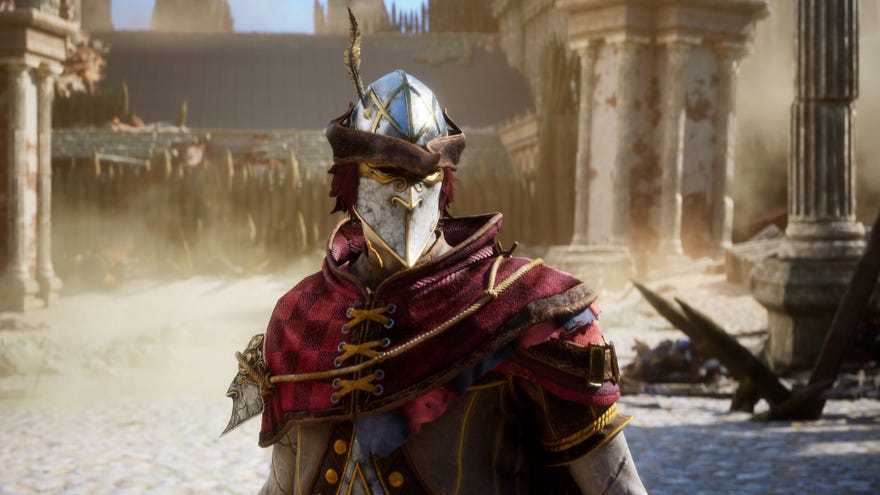Enotria: the Last Song is a lot like other action RPGs that are influenced by From Software. You carefully explore dungeons, equip enemies with a variety of weapon types, and attempt to avoid dying horribly while doing so. By this point, everything should be very recognizable, but developer Jyamma Games really tries to liven up the dish with everything else surrounding that core. Concepts that are effective, such as transforming the scene from a shady bog and gloomy cave into the sparkling light of sunny mountainsides and vibrant cities, truly do work. Things that don’t, such as the excessive number of confusing items to equip and unlock and the clumsy performance problems, prevent Entoria’s name from joining the expanding list of games that transcend beyond being merely another soulslike.
Comparable to other From Software-influenced action RPGs is how Enotria: The Last Song plays. You take your time exploring dungeons, arming foes with various weapons kinds, and trying not to die horrifically in the process. Everything should be quite familiar by now, but developer Jyamma Games makes a serious effort to add some flavor to the dish’s surrounding elements. Effective ideas, like changing the atmosphere from a dark and shaded swamp to the bright lights of sunny mountainsides and bustling cities, really do work. Things that don’t, like the overwhelming amount of perplexing things to equip and unlock and awkward performance issues, keep Entoria’s name from joining the growing list of games that do more than just pass for soul likes.
Everyone on this more colorful planet is imprisoned in a never-ending cycle of repetition and monotony due to sinister corruption. Stage plays are full of metaphors, with everyone acting out roles similar to actors, especially in the beginning. However, as I got farther into the story, I noticed that my interest in the plot waned. While some of the characters’ interactions with one another can be fascinating, this story is quite mysterious in a soulslike way, so I was not too eager to figure it all out.
Although the enemies in each area differ drastically from one another, they might eventually get somewhat monotonous within each region. That does not imply they can not be hazardous throughout, but it takes me roughly five hours to travel through each region, and I saw most of what I might anticipate from it rather early on.
The majority of the bosses I faced were enjoyable, and the greatest ones offered interesting challenges that broke up the dungeon crawling. However, not all of them are hits: There were moments when I faced formidable foes like a large, spiny hermit crab or a golden conquistador who could pass for a Final Fantasy dragoon and moments when I faced the same knight four times, each time using different colored armor and the same set of sword combinations.
Additionally, a few erratic performances serve to somewhat discredit everything else. When moving into new areas or engaging in combat outside in extremely bright light, even my dependable combination of an Intel Core i9-9000 processor and an RTX 3070 GPU found it difficult to maintain a consistent frame rate. Seeing such lovely areas grind so severely was always disappointing, no matter what combination of settings I attempted.
Even with framerate issues, I am ready to overlook such things because fighting is rather robust and it is always fun to take on new opponents. Anybody familiar with these kinds of games would recognize that the fundamental attacks—which are controlled by stamina—are light and heavy. There is no blocking, and parrying does not immediately stun opponents; instead, it builds a gauge that gradually exposes adversaries to powerful blows. Entoria felt far more approachable in the early game because of its more forgiving parry window than in titles like Lies of P, which likewise bases its defensive strategy around counters.
About halfway through this roughly 30-hour campaign, you should anticipate having numerous adversaries to face up against at once or having your deflect button tested frequently by enemies with longer attack strings. Although I like how this kind of challenge was eased into the game gradually, there were moments when I thought the cramped camera and the lock-on with an independent mind were being used by the enemy.
Verdict
Enotria: The Last Song truly tries to go outside the box when it comes to customizing the typical soulslike, aside from the mechanics of battle. The untamed, Italian folklore-inspired figure designs and sun-drenched settings are a welcome change of pace, straight out of the Alps of Italy. Combat is enjoyable despite the bloat of numerous systems that control all of the more intricate skills and attributes, as well as unexpected difficulty spikes (because the majority of those fights are optional anyhow). What truly keeps Enotria from taking center stage are its unapproachable RPG systems and its erratic performance when a smooth frame rate matters most.

